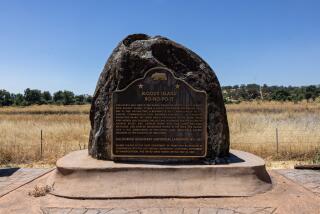Deputies Give Russia a ‘New’ Name : Legislation: The nationalist vote reverting to the czarist-era ‘Rossiya’ sparks panic among minorities.
- Share via
MOSCOW — Bucking President Boris N. Yeltsin’s advice, the Russian Congress voted Thursday to rename the country simply “Russia” in an outburst of nationalist fervor that threw minority groups into a panic over their future status.
“Today we have given back the old names to many streets, squares and towns,” Anatoly I. Makeyev, an ethnic Russian lawmaker from the Urals, told the Congress of People’s Deputies. “It only makes good sense to go back to the old name of our state.”
Ignoring warnings that to restore the historic name of the world’s largest country would hamper new attempts at federalism and goad ethnic separatists, the Parliament, in a rare show of patriotic accord, voted 871 to 30 to revive the name Rossiya.
Some envoys from minority homelands threatened to boycott the Congress if the decision is not revoked, and urgent efforts were under way Thursday night by pro-Yeltsin forces to forge a compromise that seemed to include keeping “Russia” in the name.
For decades, Russia had officially been called the “Russian Soviet Federated Socialist Republic”--a Soviet-era label that was a claim of ideological purity--and then the “Russian Federation” after last August’s unsuccessful putsch against then-Soviet President Mikhail S. Gorbachev.
Russia’s smaller working legislature and Yeltsin had recommended to the Congress that the constitution be amended to make the independent state’s new official name “Russian Federation (Russia).”
The somewhat complicated label, complete with parentheses, was supposed to simultaneously satisfy Russians’ national pride and reassure skittish minorities that power is being decentralized and that they have genuine opportunities for home rule.
“Under the name Russian Federation, our state has entered into the world commonwealth,” said Yeltsin’s representative at the Congress, Sergei M. Shakhrai. “And under the flag of the Russian Federation, the federal treaty has been signed.”
But many deputies were stone-deaf to his reasoning. In preliminary voting to weed out a list of seven suggested names for the Russian state, Yeltsin’s choice got only 497 votes, far short of the two-thirds majority needed for a constitutional amendment.
After a separate, binding ballot to confirm the choice as Russia, the deputies meeting in a Kremlin hall dominated by a large Russian tricolor flag applauded, stamped their feet or lustily pounded their desks.
“What has happened here today is a kind of turning point that shows Russian politicians can still defend the interests of the state,” said Victor V. Aksyuchits, an avowed Russian nationalist.
But radical democrat Sergei M. Yushenkov rejected the emotion-charged decision as unacceptable, asserting that “in today’s political situation, it will definitely spur local nationalism.”
“For Russians, the (new) name has associations of the Motherland, but for the national republics, it has associations of the Russian Empire,” agreed Renat Mukhamatdiyev, a Tatar deputy.
After a break for lunch, deputies representing some of the 20 minority “republics” inside Russia issued a statement denouncing the “crushing blow” by the Congress to the Federation Treaty signed by 18 of the homelands and Yeltsin only last month.
The obstinate refusal of two ethnic homelands, Tatarstan and Chechen-Ingushetia, to sign the treaty has shown how difficult it has been for Yeltsin and his allies to bind this vast, multiethnic country together.
Two deputies, Said-Khamsat Nunuyev, a Chechen, and Gulfiya Idelbayeva, a Bashkir, said the delicate balance of powers between Moscow and the republics set forth in the treaty has been thrown into question by reverting to the czarist-era name Rossiya.
In halting Russian, one non-Russian deputy called the Congress’ decision a “slap in the face from Big Brother.”
Intriguingly, in brief remarks shown on Russian television Thursday evening, Yeltsin himself seemed to have undergone a change of heart during the day and to bless the Congress’ decision.
“At last we have ripened to the point where we can call Russia ‘Russia,’ ” said the president, who has not attended any of the Congress sessions this week.
But as Thursday’s meeting of Congress adjourned, Yeltsin’s designated hitters were pushing hard for a formula that would satisfy both Russians and non-Russians. Shakhrai said Yeltsin was drawing up a proposal for a constitutional preamble stressing the federal and republic nature of the Russian state.
One suggestion from Deputy Nikolai Ryabov, endorsed by Shakhrai, would require adding a sentence to the constitution declaring, “Russia is a sovereign, federative state formed by the peoples who have been brought together by history in it.”
Ruslan Khasbulatov, the Speaker of the Congress and an ethnic Chechen, said a consultative committee of deputies from the non-Russian republics was being set up to discuss the controversy.
To resolve the issue, Yeltsin and his allies will have to tread a fine line, satisfying both Russians’ reawakened sense of nationhood and the fears of the more than 100 ethnic minorities that, as in czarist or Soviet times, they might revert to the status of subject peoples.
Viktor K. Grebenshikov, a reporter in The Times’ Moscow bureau, contributed to this article.
More to Read
Sign up for Essential California
The most important California stories and recommendations in your inbox every morning.
You may occasionally receive promotional content from the Los Angeles Times.













